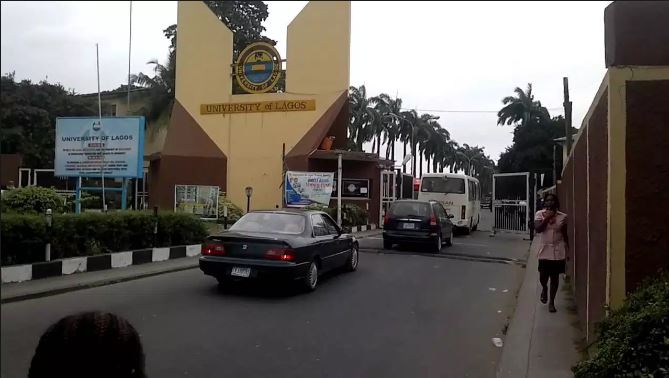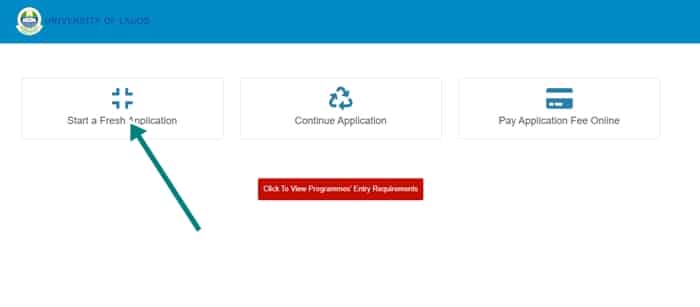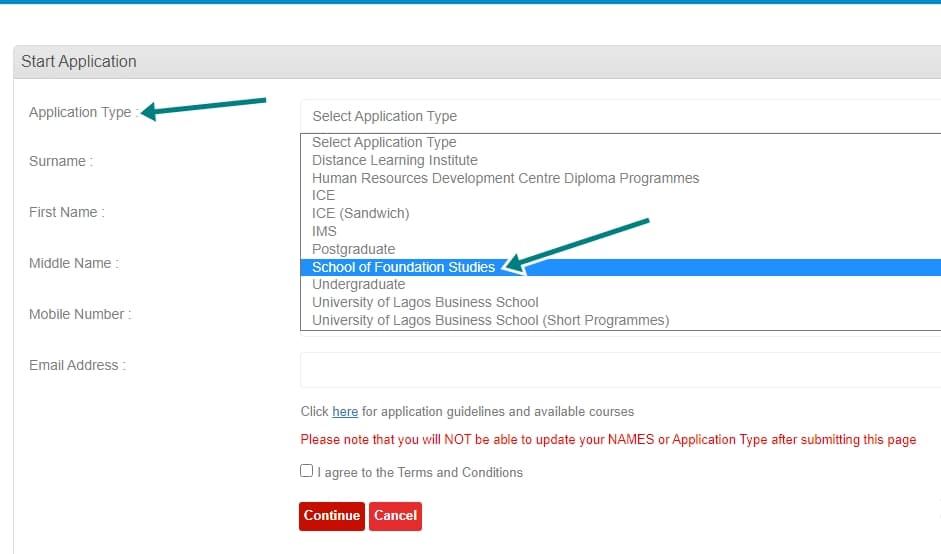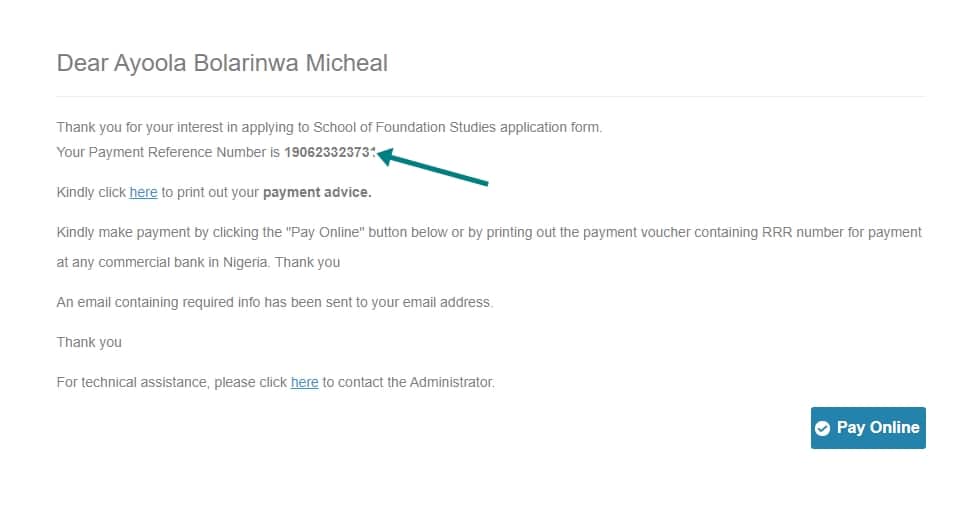UNILAG Foundation Programme Application Form [2023/2024]
Are you looking for information on the UNILAG foundation programme application form?
The Unilag Foundation programme is also known as the UNILAG JUPEB, UNILAG diploma programme or the UNILAG Pre-degree programme. It is a one-year programme that lets successful candidates gain admission into UNILAG 200-Level.
In this article, you will learn about the UNILAG Foundation programme and how to apply for it.
What is the UNILAG Foundation Programme?
The University of Lagos Foundation programme is a one-year programme for undergraduates. On completing this programme, successful candidates will gain admission into the University to study from 200-level.
Successful candidates could also be offered admission into the University of Central Lancashire, University of Bedfordshire, De Montfort University, University of Birmingham (UK), and Soochow University, China.
The UNILAG Foundation programme is done in partnership with the Joint Universities Preliminary Examinations Board.

The Unilag Foundation programme is not available for visually impaired students and it is strictly non-residential. Non-residential means students won’t be given a hostel/accommodation in the school.
Who can Apply for the Unilag Foundation Programme?
- Secondary school graduates who want to study into UNILAG.
- JAMB candidates who could not gain admission into UNILAG through Post-UTME/screening.
Unilag Foundation Programme Admission Requirements
Candidates who are interested in this programme must have at least five credit passes in English Language, Mathematics, and three other relevant subjects obtained in one sitting. Unilag accepts WASSCE/SSCE, GCE, and NECO.
O’level results must be gotten before applying for the form. Awaiting result is not accepted.
Please note that The University of Lagos has zero tolerance for sexual harassment, drug abuse, anti-social behaviours and examination malpractice. All admitted students will undergo a compulsory medical test by the institution.
Unilag Foundation/JUPEB/Diploma Subject Combinations
Below are the subject combinations that will be offered to students of the foundation programme. Note that, these are not the subjects required to gain admission into the programme. For the required subjects, read the previous paragraph.
- ACC_BUS_ECO: SFS01
- ACC_ECO_GEO: SFS02
- ACC_ECO_GOV: SFS03
- ART_CRS_GOV: SFS04
- ART_CRS_MUS: SFS05
- ART_GOV_MUS: SFS06
- ART_LIT_MUS: SFS07
- ART_MAT_PHY: SFS08
- BIO_CHE_PHY: SFS09
- BIO_ECO_GEO: SFS10
- BIO_ECO_GOV: SFS11
- BIO_ECO_LIT: SFS12
- BIO_MAT_PHY: SFS13
- BUS_ECO_GOV: SFS14
- CHE_ECO_MAT: SFS15
- CHE_PHY_MAT: SFS16
- CRS_FRE_LIT: SFS17
- CRS_GOV_MUS: SFS18
- CRS_GOV_YOR: SFS19
- CRS_GOV_IGB: SFS20
- CRS_LIT_HIS: SFS21
- CRS_LIT_MUS: SFS22
- ECO_GEO_GOV: SFS23
- ECO_GOV_ISS: SFS24
- ECO_GOV_LIT: SFS25
- ECO_MAT_PHY: SFS26
- FRE_GOV_ISS: SFS27
- FRE_HIS_ISS: SFS28
- GOV_CRS_ECO: SFS29
- GOV_HIS_ISS: SFS30
- GOV_LIT_HIS: SFS31
- GOV_LIT_MUS: SFS32
- HIS_GOV_CRS: SFS33
- ISS_GOV_LIT: SFS34
- LIT_GOV_CRS: SFS35
- LIT_HIS_ISS: SFS36
- MAT_GEO_ECO: SFS37
- MAT_PHY_GEO: SFS38
- GOV_ISS_ECO: SFS39
- BIO_CHE_ECO: SFS40
The subjects above are subject codes. The translation of the subject codes above can be seen below;
- MAT: Mathematics
- ACC: Accounting
- BIO: Biology
- ART: Visual Arts
- CHE: Chemistry
- ECO: Economics
- BUS: Business Studies
- FRE: French
- HIS: History
- CRS: Christian Religious Studies
- GEO: Geography
- IGB: Igbo
- LIT: Literature in English
- GOV: Government
- ISS: Islamic Studies
- PHY: Physics
- MUS: Music
- YOR: Yoruba
List of Courses Offered in the Unilag Foundation Programme.
Below is the list of courses offered in the Unilag foundation/JUPEB/Diploma programme;
- Foundation In Accounting.
- Foundation In Actuarial Science.
- Foundation In Adult Education.
- Foundation In Architecture.
- Foundation In Biochemistry.
- Foundation In Biology Education.
- Foundation In Botany.
- Foundation In Building.
- Foundation In Business Administration.
- Foundation In Business Education.
- Foundation In Cell Biology & Genetics.
- Foundation In Chemical Engineering.
- Foundation In Chemistry.
- Foundation In Civil & Environmental Engineering.
- Foundation In Computer Engineering.
- Foundation In Computer Sciences.
- Foundation In Dentistry.
- Foundation In Early Childhood Education.
- Foundation In Economics.
- Foundation In Economics Education.
- Foundation In Educational Administration.
- Foundation In Electrical & Electronics Engineering.
- Foundation In English.
- Foundation In English Education.
- Foundation In Estate Management.
- Foundation in Finance.
- Foundation In Fisheries.
- Foundation in French.
- Foundation In Geograph.
- Foundation In Geography Education.
- Foundation In Geology.
- Foundation In Geophysics.
- Foundation In Guidance & Counselling.
- Foundation In History & Strategic Studies.
- Foundation In Home Economics.
- Foundation In Human Kinetic & Health Education.
- Foundation In Industrial Relations & Personel Management.
- Foundation In Insurance.
- Foundation In Integrated Science.
- Foundation In Law.
- Foundation In Marine Biology.
- Foundation In Mass Communication.
- Foundation In Materials & Metallurgical Engineering.
- Foundation In Mathematics.
- Foundation In Mathematics Education.
- Foundation In Mechanical Engineering.
- Foundation In Medical Laboratory Sciences.
- Foundation In Medicine & Surgery.
- Foundation In Microbiology.
- Foundation In Music.
- Foundation In Nursing Sciences.
- Foundation In Petroleum & Gas Engineering.
- Foundation In Pharmacology.
- Foundation In Pharmacy.
- Foundation in Philosophy.
- Foundation In Physics.
- Foundation In Physics Education.
- Foundation In Physiology.
- Foundation In Physiotherapy.
- Foundation In Political Science.
- Foundation In Psychology.
- Foundation In Quantity Surveying.
- Foundation In Radiography.
- Foundation In Russian.
- Foundation In Sociology.
- Foundation In Sports Science.
- Foundation In Surveying & Geoinformatics.
- Foundation In Systems Engineering.
- Foundation In Theatre Arts.
- Foundation In Urban & Regional Planning.
- Foundation In Visual Arts.
- Foundation in Yoruba.
- Foundation in Zoology.
How to Apply for the UNILAG Foundation/JUPEB/DIPLOMA Programme.
Follow the steps below to apply for the UNILAG foundation programme form;
Step 1: Visit the UNILAG application portal
The UNILAG application portal is where all the entry applications to the University of Lagos are done.
Visit the UNILAG application portal using this link or by typing applications.unilag.edu.ng in your browser.
On getting to the portal, click on “start fresh application”.

Step 2: Fill in your details
Under application type, select “school of foundation studies”.

Fill in your surname, first name and middle name as they appear on your O-level certificate. Also, enter your correct phone number and email address.
Accept the terms and conditions by ticking the appropriate box, then click on submit.
Step 3: Make Payment
Before you make the payment, take note of your payment reference number (PFR). You will need this number to log in later on.

Click “Pay online” to start the payment process.
On the next page, click on “Pay online with Remita”. Copy the Remita reference number (RRR).
Click on the Pay with Remita link or visit Remita using this link, select the Pay E-invoice tab and paste the Remita retrieval reference number you copied earlier in the box provided. Click on submit.
Click on submit once again and enter your card details to complete the payment.
Step 4: Complete the Application Form
After payment, go back to the UNILAG application portal and log in with your payment reference number as your username and surname as your password.
Note that the password must be in small letters.
Once you are logged in, complete the application form by uploading your passport photograph and filling in other relevant information. Click on submit when you are done.
Step 5: Print your Application Form
The school recommends that you print two copies of your UNILAG foundation programme application form. You may need to submit one copy to the school later on.
Deadline for Registration
The UNILAG foundation programme application form went on sale on June 12, 2023 and will close on August 11, 2023.
Entrance Examination
There will be an entrance exam for all applicants. Only candidates who pass this exam will be offered admission into the UNILAG Foundation programme.
Candidates will have access to the Foundation programme practice questions one week before the exam.
The University of Lagos Foundation programme entrance exam has been scheduled to hold on Saturday 19, August 2023.
The subjects each candidate will attempt in the entrance exam depend on the course chosen. Candidates will attempt Mathematics (20 questions), English language (20 questions) and three other relevant subjects with 15 questions each.
A total of 85 questions will be asked in the computer-based exam.
We hope this article has given you more information on the UNILAG Foundation programme. You can also read our article on the UNILAG Post-UTME Form and the LASU Foundation Programme.
If you love content like this and you want to get more, you can join our WhatsApp tv for more updates.